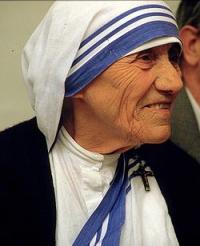|
|
|
Mother Teresa (26 August 1910 - 5 September 1997), born Agnes Gonxha Bojaxhiu (pronounced -sqaɡˈnɛs ˈɡɔndʒa bɔjaˈdʒiu), was a Catholic nun of Albanian ethnicity and Indian citizenship, who founded the Missionaries of Charity in Calcutta, India in 1950. For over 45 years she ministered to the poor, sick, orphaned, and dying, while guiding the Missionaries of Charity's expansion, first throughout India and then in other countries. Following her death she was beatified by Pope John Paul II and given the title Blessed Teresa of Calcutta. In the 1970s, she became well-known internationally for her humanitarian work and advocacy for the rights of the poor and helpless, which was documented by Malcolm Muggeridge in his documentary and subsequent book Something Beautiful for God. Mother Teresa's Missionaries of Charity continued to grow during her life-time, and at the time of her death, they had 610 missions in 123 countries , including hospices and homes for people with HIV/AIDS, leprosy and tuberculosis, soup kitchens, children's and family counselling programs, orphanages, and schools. Governments, charity organisations and prominent individuals have been inspired by her work. She received numerous awards, including a number from the Indian Government, one of which was the Bharat Ratna (1980), as well as international awards, such as the Nobel Peace Prize in 1979. She has not been without her critics, however, including prominent atheist Christopher Hitchens, cultural critic Michael Parenti, Indian-English Medical Doctor Aroup Chatterjee and the World Hindu Council (Vishva Hindu Parishad). They accuse her of proselytizing, strongly opposing contraception and abortion, believing in poverty's spiritual goodness and alleged 'secret baptisms of the dying'. In 2010 on the 100th anniversary of her birth, she was honoured around the world, and her work praised by Indian President Pratibha Patil. |




 RSS
RSS